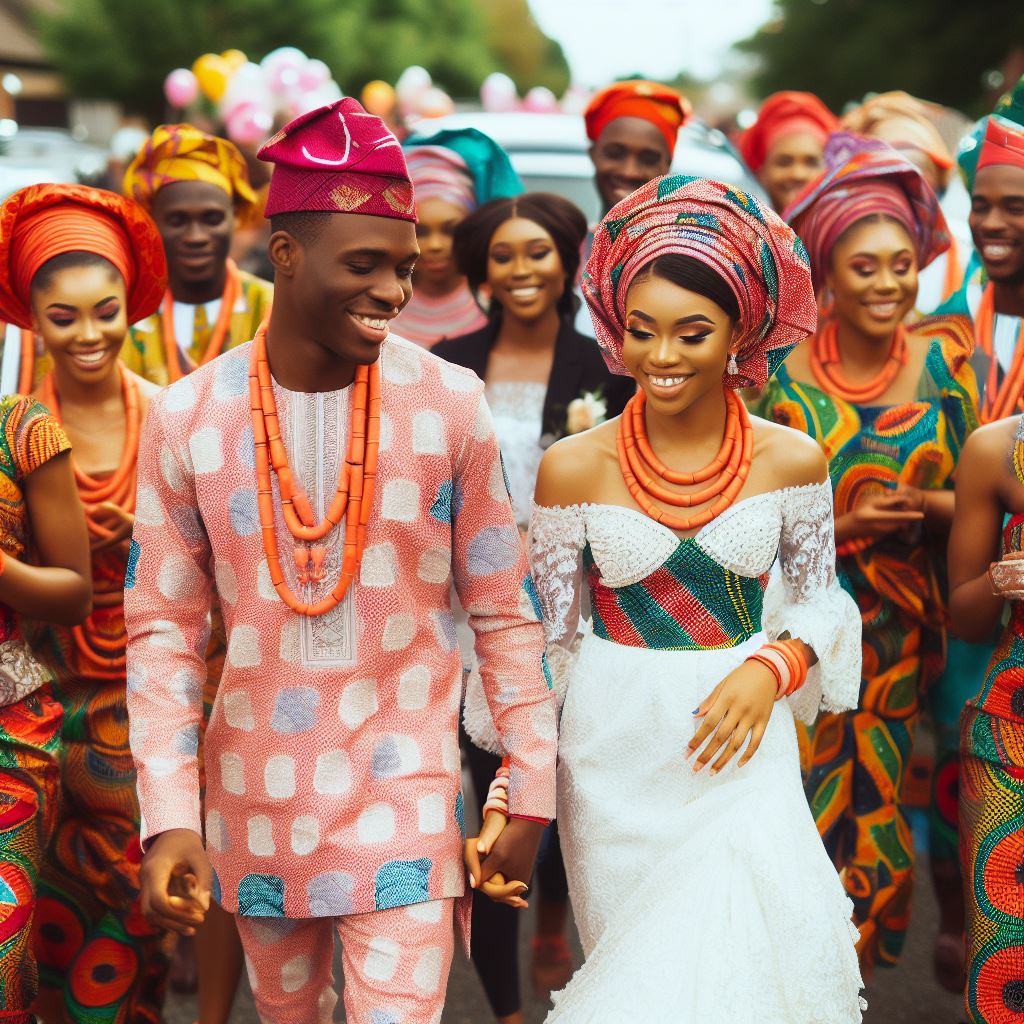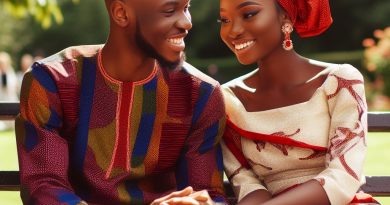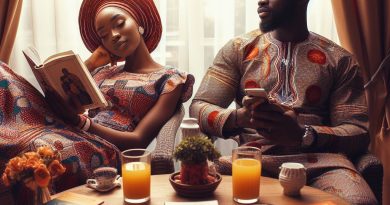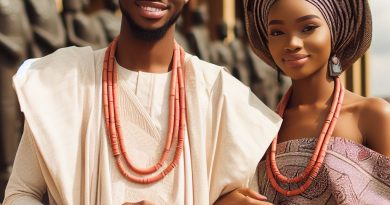How Modern Trends are Shaping Nigerian Marriage Norms
Last Updated on October 17, 2023
Introduction
Modern trends are significantly shaping Nigerian marriage norms, reflecting the evolving nature of marriage in the country. As societal changes occur, understanding these shifts becomes increasingly important.
The importance of understanding the evolving nature of marriage in Nigeria
- Preservation of Tradition: Understanding evolving norms helps preserve essential cultural traditions within marriage.
- Gender Equality: Recognizing changes promotes gender equality, giving women more autonomy and freedom in marital choices.
- Social Harmony: It fosters social harmony by accommodating diverse perspectives and lifestyles.
- Economic Factors: Modern marriages often adapt to economic challenges, influencing financial roles and responsibilities.
- Legal Implications: Familiarizing with evolving norms ensures adherence to changing legal and marital rights.
- Generational Understanding: Bridging the generational gap is vital for maintaining family cohesion and harmony.
- Cultural Sensitivity: It encourages cultural sensitivity, considering diverse beliefs and practices.
- Adapting to Modern Life: Understanding evolving marriage helps Nigerians adapt to contemporary living while respecting their heritage.
In short, comprehending and accepting the evolving nature of marriage in Nigeria is vital for preserving tradition, promoting equality, and ensuring social harmony in a changing world.
Traditional Nigerian Marriage Norms
Traditional norms and practices surrounding marriage in Nigeria
- The traditional norms and practices surrounding marriage in Nigeria are deeply rooted in cultural values.
- Marriage is seen as a sacred institution that brings together two families and not just two individuals.
- Arranged marriages were common in the past, where families played a significant role in choosing a spouse.
- In traditional Nigerian marriages, the bride’s family receives a bride price as a token of appreciation.
- Marriage ceremonies are elaborate events that involve various rituals, customs, and traditions.
- The involvement of extended family members and community members in the marriage ceremony is crucial.
- Gender roles and expectations in traditional Nigerian marriages are clearly defined.
- Men are expected to be the providers and protectors of the family, while women are expected to be submissive and supportive.
- Women are also responsible for managing the household and taking care of children.
- Respect for elders and authority is highly emphasized in traditional Nigerian marriages.
- Divorce was uncommon in traditional Nigerian marriages as it was seen as a failure and disgrace.
- Marriage in Nigeria was primarily focused on procreation and ensuring the continuity of the family lineage.
- Traditional marriage ceremonies are colorful and vibrant, showcasing the rich cultural heritage of Nigeria.
- Various traditional attire, music, and dance forms are incorporated into the marriage ceremonies.
- The traditional norms and practices surrounding marriage in Nigeria have evolved over the years.
Influence of Cultural Values, Customs, and Traditions
- Cultural values, customs, and traditions play a significant role in shaping marital practices in Nigeria.
- These values are deeply ingrained in the society and are passed down from generation to generation.
- Marriage is seen as a way to preserve cultural identity and maintain social cohesion.
- Traditional wedding ceremonies are an opportunity to showcase cultural traditions and customs.
- The influence of cultural values can be seen in the expectations placed on married couples.
- For example, humility, respect, and obedience are highly valued qualities in a Nigerian marriage.
- Customs such as the payment of bride price and dowry are still prevalent in many Nigerian marriages.
Gender Roles and Expectations
- Gender roles and expectations in traditional Nigerian marriages are often patriarchal in nature.
- Men are expected to be the breadwinners and decision-makers in the family.
- Women are expected to be obedient to their husbands and take care of the household and children.
- However, with modern trends and changing societal dynamics, these gender roles are being questioned.
- There is a growing recognition of the importance of gender equality and women’s empowerment in marriages.
- Many Nigerian couples are now challenging traditional gender roles and sharing household responsibilities.
- Women are increasingly pursuing careers and education, challenging traditional expectations.
- These changes are gradually shaping Nigerian marriage norms and promoting more equality within marriages.
Shift towards Western Influences
1. Impact of globalization and westernization on Nigerian marriage norms
Globalization and westernization have significantly influenced Nigerian marriage norms, bringing about a transformation in traditional practices.
2. Influence of media, education, and technology on changing perceptions of marriage
The influence of media on changing perceptions of marriage
Media plays a vital role in shaping Nigerian marriage norms as it exposes people to different lifestyles and relationships portrayed in Western culture.
The impact of education on changing perceptions of marriage
Education has played a crucial role in challenging traditional Nigerian marriage norms by encouraging critical thinking and individualism among young Nigerians.
The role of technology in changing perceptions of marriage
Technology has made it easier for Nigerians to access information about Western marriage norms and explore alternative ideas about love and partner selection.
3. The increasing acceptance of Western concepts
Love marriages
Nigerian society is gradually embracing the idea of love marriages, which prioritizes emotional connections and personal compatibility rather than solely relying on arranged marriages.
Individual choice in partner selection
The autonomy of choosing a life partner is gaining momentum in Nigerian society, with individuals having more freedom to select their partners based on personal preferences.
Changing family dynamics
The Western influence on Nigerian marriage norms has led to a shift in family dynamics, with nuclear families becoming more common and extended family involvement decreasing.
Influence of Western wedding traditions
Western wedding traditions, such as white wedding ceremonies, have gained popularity in Nigeria, with many couples incorporating these elements into their marriage celebrations.
Rising divorce rates
The increasing acceptance of Western values and ideas of individual happiness has also led to a rise in divorce rates in Nigeria, as unhappy couples are more willing to seek separation.
Impact on gender roles
Western influences have challenged traditional gender roles in Nigerian marriages, with more women pursuing education and careers, resulting in a more egalitarian approach to marriage.
Change in expectations of marital roles
As Nigerian society becomes more influenced by Western norms, there is a shift in expectations regarding marital roles, with both spouses sharing household responsibilities and decision-making.
Impact on interfaith and interethnic marriages
Western influences have contributed to a rise in interfaith and interethnic marriages in Nigeria, as individuals are more willing to marry outside their religious or ethnic groups.
Challenges from conservative elements
Despite the increasing acceptance of Western concepts, conservative elements within Nigerian society often resist these changes, leading to tension and conflicts between traditional and modern norms.
Influence on wedding ceremonies
Western influences have also affected Nigerian wedding ceremonies, with couples incorporating Western traditions like exchanging rings or having bridal showers.
Economic implications
The adoption of Western marriage norms has financial implications, as Nigerian couples may now bear the costs associated with Western-style weddings, such as elaborate receptions and bridal parties.
Impact on the institution of marriage
Overall, the shift towards Western influences has significantly impacted the institution of marriage in Nigeria, bringing about changes in perceptions, expectations, and practices.
In summary, globalization and westernization have brought significant changes to Nigerian marriage norms.
The influence of media, education, and technology has played a crucial role in shaping perceptions of marriage.
Western concepts of love marriages, individual choice in partner selection, and changing gender roles have gained acceptance.
However, conservative elements and economic implications continue to pose challenges as Nigerian society navigates this transition.
Read: Fortifying Love: Muslim Duas for Marriage Anniversaries in Nigeria
Rise of Co-habitation
Co-habitation, the practice of unmarried couples living together, is on the rise among young Nigerians.
Economic factors often drive this choice, as couples find it financially practical.
Changing societal norms have made co-habitation more socially acceptable. Young couples see it as a way to test compatibility before marriage.
Exposure to Western ideas about relationships, facilitated by technology and urbanization, has played a significant role.
However, this trend raises questions about family approval and long-term stability. Legal protections for co-habiting couples are limited in Nigeria.
Despite the challenges, the trend reflects evolving marriage norms in modern Nigeria.
Understanding this trend is crucial for those navigating the changing landscape of Nigerian marriage norms, illustrating the complex interplay of tradition and modernity.
Factors contributing to the rise of co-habitation
- Economic Realities: Financial constraints drive young couples to share living expenses and pool resources.
- Changing Social Norms: Evolving societal attitudes make co-habitation more socially acceptable.
- Delayed Marriage: Couples postpone formal marriage due to education, career pursuits, or other personal goals.
- Compatibility Testing: Co-habitation is seen as a way to evaluate long-term compatibility before marriage.
- Western Influence: Exposure to Western relationship models and urbanization has led to a shift in mindset.
- Desire for Autonomy: Young Nigerians seek independence and control over their relationships.
- Family Approval: In some cases, families now endorse co-habitation, supporting the choice of their children.
- Limited Legal Protections: Nigerian law doesn’t offer the same rights and protections to co-habiting couples as to married ones.
- Cultural Fusion: Co-habiting couples blend traditional values with modern lifestyles, reflecting a changing society.
- Co-habitation is emblematic of how modern trends are reshaping Nigerian marriage norms, reflecting a dynamic and evolving landscape.
The challenges and benefits associated with co-habitation in the Nigerian context
Challenges
- Social Stigma: Some Nigerians view co-habitation as contrary to cultural and religious values, facing societal judgment.
- Legal Protections: Co-habiting couples often have limited legal rights and protections, which can lead to disputes.
- Family Approval: Gaining family approval can be challenging, causing tension and emotional strain.
- Long-term Commitment: The lack of formal commitment may hinder relationship stability and long-term planning.
Benefits
- Financial Practicality: Sharing expenses can be economically advantageous, particularly for young couples.
- Compatibility Testing: Co-habitation allows couples to assess their long-term compatibility before marriage.
- Autonomy: It offers greater personal freedom and autonomy in the relationship.
- Delaying Marriage: Co-habitation aligns with the trend of delaying marriage for career and personal development.
In summary, co-habitation in Nigeria presents both challenges and benefits, reflecting the complex interplay of tradition and modernity in evolving marriage norms.
Read: Eternal Love and Unity: Prayers for Your Nigerian Marriage Milestone

Changing Gender Dynamics
Changing gender roles are reshaping Nigerian marriages. Women increasingly pursue education and careers, contributing to family income.
While traditional expectations persist, there’s a shift toward more equitable partnerships. Men are participating more in household and child-rearing responsibilities.
Economic pressures influence this change, with couples adapting to dual-income households.
Education empowers women, providing them with a stronger voice in marital decisions.
Challenges still exist, with gender-based violence and unequal power dynamics persisting in some cases.
Despite these hurdles, the changing role of gender in Nigerian marriages reflects societal progress and evolving norms.
Understanding and supporting this transition is crucial for building healthier, more equal partnerships and promoting individual fulfillment.
The increasing emphasis on gender equality and the empowerment of women
Modern trends are spotlighting gender equality and the empowerment of women within Nigerian marriages.
Women’s education and career pursuits are advancing, enhancing their financial independence and role in decision-making.
This shift signifies a move towards more balanced partnerships and the recognition of women’s rights and potential.
Increasing awareness about gender equality is fostering discussions on traditional gender roles and responsibilities.
Empowering women in marriages is strengthening families, benefiting society, and contributing to overall progress in Nigeria.
Supporting and promoting gender equality and women’s empowerment in marriages is essential for a more inclusive and prosperous society.
The impact of this shift on traditional gender roles and expectations within marriages
Modern trends are revolutionizing Nigerian marriage norms, placing a growing emphasis on gender equality and women’s empowerment.
Women are pursuing education and careers, gaining financial independence and contributing significantly to family incomes.
This shift signifies a move towards more balanced partnerships and a recognition of women’s rights and potential.
Increasing awareness about gender equality is fostering discussions on traditional gender roles and responsibilities, sparking positive change within households and communities.
Empowering women within marriages is strengthening families, benefiting society, and contributing to overall progress in Nigeria.
Supporting and promoting gender equality and women’s empowerment in marriages is essential for a more inclusive, equitable, and prosperous society.
Read: Nollywood Movies: Perfect for an Anniversary Date Night
Impact of Social Media
The influence of social media on Nigerian marriage norms
Social media has revolutionized Nigerian marriage norms and significantly impacted how people perceive and engage in relationships.
Firstly, social media platforms like Instagram and Facebook have created a virtual world where individuals portray their idealized versions of married life.
This has led to unrealistic expectations and pressures on couples to live up to the perfect images often portrayed online.
In addition, social media has facilitated easier and faster communication, making it easier for Nigerian couples to maintain long-distance relationships and make important decisions together.
This has significantly changed the dynamics of traditional marriages.
Social media’s influence on Nigerian marriage norms extends to shaping perceptions of beauty.
Platforms like Instagram have popularized certain beauty standards, often glorifying light skin, slim bodies, and Western hairstyles.
This can contribute to self-esteem issues and the adoption of harmful beauty practices in order to meet these unrealistic standards.
Social media has also influenced Nigerian marital expectations.
On platforms like Twitter, discussions on gender roles, expectations of financial success, and ideal spouses have become prevalent.
This has led to increased pressure on individuals to conform to these expectations in order to be deemed suitable for marriage.
The role of social media in shaping perceptions of beauty, relationships, and marital expectations
By constantly bombarding users with carefully curated images and narratives, social media shapes the way individuals perceive beauty, relationships, and their expectations for marriage.
Regarding beauty, social media platforms set trends and promote specific looks that can influence individuals’ self-perception and attractiveness standards.
This can lead to people feeling insecure about their appearance and resorting to cosmetic procedures or unhealthy eating habits to fit societal ideals.
Furthermore, social media’s portrayal of relationships influences how people approach dating and marriage.
Perfectly edited photos and romantic captions project an image of effortless love and happiness, which can create unrealistic expectations and put pressure on couples to present themselves similarly online.
Social media also plays a significant role in shaping marital expectations.
Influencers and celebrities often display lavish weddings and extravagant lifestyles, leading to a desire for grandiose ceremonies and materialistic displays of affection.
The potential positives and negatives of social media on marital relationships
While social media has its perks, it also poses challenges to marital relationships in Nigeria.
On one hand, social media acts as a bridge, connecting couples who are physically apart. It facilitates constant communication, allowing partners to feel involved in each other’s lives despite distance.
Additionally, social media can provide a platform for support and mentorship.
Joining online communities or following couples with similar experiences can offer guidance and advice to couples facing challenges in their marriage.
However, social media can negatively impact marital relationships by causing jealousy, mistrust, and decreased intimacy.
Constant exposure to other people’s seemingly perfect relationships can lead to comparison and feelings of inadequacy.
The constant distraction of social media can also take away quality time that couples could spend together, leading to a decrease in emotional connection and shared experiences.
Social media has had a profound impact on Nigerian marriage norms. It influences perceptions of beauty, relationships, and marital expectations.
While it brings both benefits and challenges to marital relationships, it is crucial for couples to navigate social media usage consciously and establish boundaries to protect the well-being of their relationship.
Read: Celebrating Marital Bliss: A Compilation of Nigerian Anniversary Prayers
Conclusion
In this blog post, we explored how modern trends have shaped Nigerian marriage norms.
We discussed the influence of globalization and social media on changing perceptions of marriage.
Additionally, we examined the impact of economic factors and women’s empowerment on marital relationships.
Nigerian marriage norms are continuously evolving, and it is important for individuals and society to adapt to these modern trends.
The traditional expectations surrounding marriage are slowly giving way to more flexible and individualistic approaches.
As we embrace these changes, it is crucial to continue learning and engaging in discussions about Nigerian marriage norms.
By staying informed, we can navigate these changes with understanding and respect.
Let us encourage open dialogue, where ideas and perspectives can be shared and valued.
Together, we can shape the future of Nigerian marriage norms, ensuring a society that embraces diversity and promotes healthy relationships.


